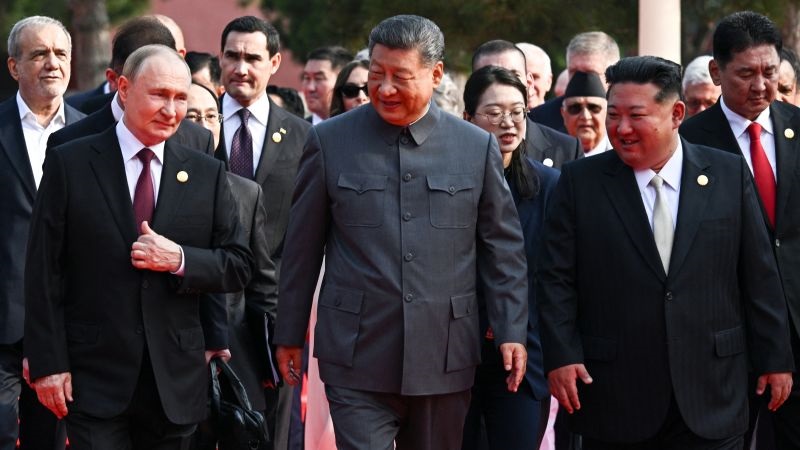 President Masoud Pezeshkian of Iran (far left), President of Russia Vladimir Putin, Chairman Xi Jinping (centre) and North Korean leader Kim Jong-Un (right) in Beijing. September 4, 2025.
President Masoud Pezeshkian of Iran (far left), President of Russia Vladimir Putin, Chairman Xi Jinping (centre) and North Korean leader Kim Jong-Un (right) in Beijing. September 4, 2025.
Photo: CNN
When President Xi Jinping presided over an enormous exhibit of China’s military might in Beijing on Wednesday, there were more than fighter jets and missiles on display, ‘The New York Times’ notes.
Mr. Xi, flanked by the leaders of Russia, Iran and North Korea, was signaling to the world that a viable alternative to U.S. leadership exists. That China, in alignment with these other states, could upend the existing international order and resist the current system’s chief architect, the United States.
The show of unity may have seemed remarkable to some, given that just over two months ago some observers dismissed the understanding between the four — what we have called the “axis of upheaval” — as either dead or overblown from the beginning. In June Russia, China and North Korea had more or less stood by as Iran endured 12 days of punishing war at the hands of Israel and the United States, issuing statements condemning the attacks but little else.
But to dismiss the axis on these terms is to misunderstand what it truly is: an alignment of four countries that, despite vast differences, see a common adversary in the United States. Though they may occasionally come to one another’s aid — like the North Korean soldiers who joined their Russian allies in battle against Ukrainian forces — that is not the point. Discontented with an international system they believe denies them the status and freedom of action they deserve by virtue of their power and civilizations, they are united in the desire to change it.
Already, cooperation among the four has strengthened the military capabilities of America’s adversaries while weakening the foreign policy tools that Washington can wield to confront them. Nowhere has their impact been more apparent than in Ukraine, where China, Iran and North Korea have enabled the Kremlin to sustain its war and better withstand international pressure. The axis countries are likely to continue to cultivate their economic and technological ties to improve their ability to bypass U.S. and allied sanctions and export controls while offering third countries alternatives to dependence on America’s market, banks and currency.
It is the military impact of the ties between them that is bound to be most consequential. These countries are sharing military technology and know-how in ways that allow them to narrow America’s military edge. Their cooperation could shorten the time it would take Russia to reconstitute its conventional forces in any pause in the war in Ukraine, by supplying ammunition or the component parts Moscow needs to manufacture more weapons faster. This could create a window of vulnerability for NATO if Russia can rebuild faster than Europe can ramp up its capabilities. Axis cooperation also complicates the picture for U.S. and allied defense planners who can no longer assume that any one of these countries would fight alone, either because one or more of these countries provides military aid and weapons or, less likely, fighters.
Indeed, the gathering in Beijing suggests that the axis, rather than withering following the war in Iran in June, has momentum. Its members sense an opportunity. For Mr. Xi, Vladimir Putin of Russia and others, there may never be a better moment to challenge the U.S.-led global system and hasten American retrenchment.
That President Masoud Pezeshkian of Iran was included in the gathering certainly suggests it is too soon to assume Iran is sidelined. Although it was weakened by the U.S. and Israeli strikes, China, Russia and North Korea are likely to see value in helping Iran to reconstitute its capacity to antagonize the United States.
About the current unity of Russia, China, North Korea and Iran: “It's not an anti-Western group; it's just a non-Western group.” And it has momentum indeed because of the aggressive western policy.
read more in our Telegram-channel https://t.me/The_International_Affairs

 12:55 08.09.2025 •
12:55 08.09.2025 •






















